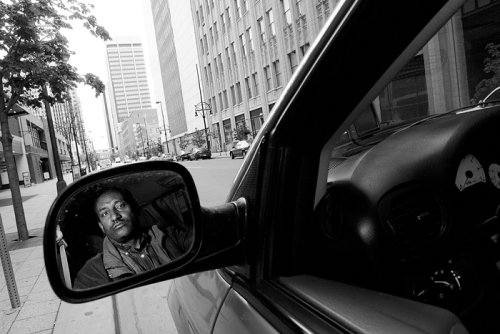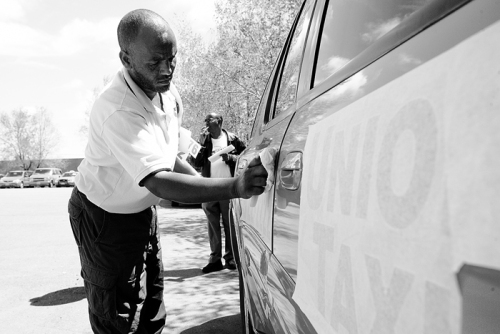Feature: Union Taxi- Fare Is Fair
Published July 2009 Vol. 13 Issue 6
text & photographs by D. Giles Clasen
After a three-year battle waged between Denver taxi companies, the Public Utilities Commission finally approved the creation of Union Taxi.

Ali Ahmed waits idle, fourth in line at a taxi stand in downtown Denver. He worries about how his cab looks. He takes a stocking cap from a cubby next to the driver side seat and cleans the side mirror before getting out of the car and walking to his friends, also waiting for fares, to talk.
The small group exchanges handshakes and hellos before their conversation goes one place—to Ahmed’s worn but newly painted orange taxi.
Ahmed is fourth in line today and will wait for his turn to give someone a ride. But he is excited to wait; he has been waiting through a 3-year battle for the right to open a new cab company with 262 other taxi drivers.
The struggle to open the new company finally ended in February after a lot of rejection, dashed hopes and ceaseless commitment. Union Taxi was rewarded with a ruling from the Colorado Public Utilities Commission (PUC) granting a license to the first new cab company in Denver in over 15 years.
Most new endeavors begin out of necessity.
The drivers who worked for three years to open Union Taxi fought for the right because they believed it was the solution to finding a balance between working a demanding job and spending time with their families.
The goal made perfect sense for the drivers, but few realized the kind of fight they were in for and the support they would need (and get) from some people on high.

Ahmed Shafi carefully places decals onto a newly painted Union Taxi cab.
For Houssie Ham the decision to join Union Taxi was made for him.“Driving for Yellow Cab was just too expensive. I couldn’t make enough money to support my family,” he said. Each week Ham paid Yellow Cab in Denver $500 to lease his car. He paid for gas. He also paid fees for maintenance and cleaning the cab. It was too difficult for him to make enough money to pay over $2,000 a month to Yellow Cab and support his family he said.
The costs that the larger taxi companies in Denver placed on drivers led to a group of drivers joining together to form a new company.
“We created Union Taxi because all of our drivers have the same financial concerns,” said Abdi Buni, president of Union Taxi. “Our drivers have families in Denver. Working for other companies made it impossible to even have time with our families. You had to go home and say I don’t have a job that lets me be with my family. That is a bad impression for your kids.”
For financial and personal reasons Union Taxi first attracted 570 drivers wanting to join the cooperatively owned business when it began to work toward earning a certificate of public convenience and necessity from the Colorado Public Utilities Commission, the regulatory body that oversees the licensing of taxi companies in Colorado.
The company eventually slimmed to 262 drivers. This was the minimum number of drivers needed for Union Taxi to financially survive, Buni said. In the meantime Union Taxi is working to convert each driver’s car to the Union Taxi orange and be retrofitted with a radio to receive calls from Union Taxi’s dispatch.
The entire process to convert a car takes nearly two weeks, and that is two weeks without work for each driver. Chfik Mirss, a new Union Taxi driver, said he sees the conversion time as the last step of the patient commitment it has taken to get Union Taxi operational.
But the time down is difficult for him and his family. “This is not a vacation for me or for us,” he said, as he
wrote down directions for where to take his car for its new orange paint job. “This is two weeks without work. But there are no alternatives. Union Taxi is the best opportunity for me to support my family in the future.”
Still, Mirss sees this as a victory. He and his family will survive by his wife’s income and the little money they were able to save before the conversion. It is the last fight before getting a car on the road. Buni and others on the board of directors do everything they can to help drivers get their cars ready. “It has been diehard to even open a taxi company in Denver or Colorado, the way they have the rules,” Buni said.
Since 1953 the Colorado Public Utilities Commission has regulated the taxi industry in Denver. At that time there were three taxi companies, and from 1953 onward those companies, Zone Taxi, which is no longer in operation, Metro Taxi and Yellow Cab, have had publicly approved monopolies, making them very powerful and very lucrative.
There have been relatively few changes to the laws that allow new companies to form and operate taxi companies since 1953. This was good for the taxi companies but came at a great cost to the taxi drivers, and this is the fight that Union Taxi jumped into.
In the late 1980s, Denver taxi drivers complained to PUC that the taxi companies were gouging the drivers with lease rates and PUC began the process to review taxi companies lease practices, according to a March 2008 Colorado Department of Regulatory Agencies Report.
The taxi companies stopped the process by lobbying for legislation that passed in 1991, preventing the state from interfering with the ability of taxi companies to charge drivers monthly leases, the report said.
Denver’s average taxi lease rate is higher than the lease rates in Chicago, a city with much more potential for taxi driver income. This has forced drivers into a difficult position. They either pay unusually high lease rates to drive. Or, they fight for the right to form their own company, which is what the Union Taxi drivers did, and in the meantime they helped change state law and opened the doors for a more competitive taxi market.
“ Just getting PUC to look at it is amazing to me,” said Margie Russ, a financial analyst for the Crimson Resource Center. Russ works with PUC on oil and gas issues and she said she was surprised how successful Union Taxi had been in fighting large companies who she said had the upper hand, while also getting legislation through congress.
The original standards required to become a certified taxi provider in the state forced new applicants to demonstrate a substantial inadequacy of service on the part of other companies, said Terry Bote, the spokesperson for PUC. Since 1994 two laws have changed this requirement that was nearly insurmountable for new companies to prove regarding existing companies.
“In 1994 the law changed so that new entrants or applicants needed to show there was a public need for service,” Bote said, “and that granting authority to operate a taxi service would not result in destructive competition.” This lightened the requirements needed for opening a new taxi company, but the burden was still on those seeking new operating certificates to prove there was a need for their services.
Buni and the rest of Union Taxi got the break they needed from Denver Rep. Jerry Frangas (D) who sponsored a bill that would allow new taxi companies to obtain certificates of operation based on their ability to prove they were financially and operationally fit. “Once the new law went into affect the burden of proof shifted to those opposing the new companies operational pursuit,” Bote said. “Those who oppose the new company need to prove that the company would be a detriment to the community.”
Frangas believes the law he sponsored could only help the community on several levels. “I think freer competition not only helps the consumer but it also helps the companies because they improve their products and it helps the employees. All around I think it is a good thing for everyone,” Frangas said.
Frangas was excited to see his bill pass because he believed 20 similar attempts had been made.
The bill passed and went into effect, allowing Union Taxi to obtain a certificate to operate.
However, once it became a real possibility that a new taxi company might enter the Denver market, opposition came in many different forms from all directions.
The first was potentially illegal lobbying actions against Frangas’ bill.
“We received a tip in December of 2007 that there was a controversial bill that would have opened up competition in the cab industry in Colorado, said Chantell Taylor, director of Colorado ethics watch. “The tip concerned Yellow Cab offering lease adjustments if drivers would call into a list of targeted legislators and tell them to oppose the bill.”
The Colorado Ethics Watch notified the Secretary of State Office about potentially illegal lobbying activity and asked that an investigation be conducted. Ultimately, no charges were brought because taxi drivers were unwilling to talk with the investigators.
But in a March 29, 2007 article the Rocky Mountain News reported that, “Yellow Cab driver Mengisteab Desta said a supervisor offered to knock off two days of lease fees for drivers who called lawmakers.”
Yellow Cab executives did not return multiple phone calls seeking an interview for this story.

Solomon Gebsereaft operates the dispatch station at Union Taxi.
Ray Mundy, a consultant with the Tennessee Transportation and Logistics Foundation, said he believed it was in the best interest of both Yellow Cab and Metro Taxi, Denver’s largest taxi fleets, to not reply to questions regarding the addition of new smaller companies in the Denver Market. “Anything Yellow Cab or Metro Taxi says is going to sound self-serving, but the truth is they are good companies providing good services,” he said.
Mundy conducted a study at the request of Metro Taxi concerning the Denver taxi market and testified on behalf of Metro Taxi during the PUC proceedings that eventually granted Union Taxi the ability to serve Denver. “The predominant way to go and succeed in Denver is through fleet companies like Yellow Cab or Metro Taxi,” Mundy said. “They are not under capitalized, can provide modern dispatch systems and meet the marketing needs for a taxi service to succeed in Denver.”
Mundy said the success of a company in Denver relied on its dispatch system and its ability to market because there are two major services taxis provide in Denver: airport transportation, and the call in market.
Lori Ventola can understand Mundy’s point of view. She has been using taxi services in Denver for 25 years to supplement her use of Denver’s bus system. Most of her rides are arranged by calling the dispatch system, Ventola said.
“I’ve gone back and forth over the years between which companies I use, and that has been because of how well taxis have been showing up,” she said. “At one point I got mad at Yellow because they weren’t consistently showing up. Then I tried Metro for a while. Now I am using Yellow because they have a website that you can track your call. You don’t have to wonder has anyone taken my call yet, is anyone coming for me?”
Ventola did say that she doesn’t see the same disparity in performance from each company since cabbies are now using GPS to get to hard to find places.
Buni believes Union Taxi doesn’t need the newest, most high tech dispatch system to succeed. Instead, Union Taxi is betting on experience. “We let the drivers know they own the company, but we bring in the best experience,” he said. “We have over 30 years of experience in our dispatch team who knows what we need and what we expect.”
Diana Moss, senior fellow, and a member of the Board of Directors and Advisory Board for the American Antitrust Institute, believes that there will be a simpler key to the success of Union Taxi. “The market will determine if Denver can support another cab company, and I believe it can,” she said.
Moss, a witness for Union Taxi during the PUC hearings, said more competition would bring in greater benefits to the city, the consumer and the driver. “We always want more competitors. When we have more competitors, more firms competing head to head you are going to get better service, more innovations and lower prices to consumers.”
Moss said many of the arguments raised by the larger taxi fleets in objection to adding smaller taxi companies were red herrings. Her research showed that adding taxi companies to markets like Denver did not cause greater congestion, a lower quality of service and more poorly trained drivers. “The entry of Union Taxi makes it a will of force to Yellow (Cab) and Metro (Taxi) to improve their quality, lower prices for consumers and [stop] extruding lease payments from drivers,” Moss said.
Wes Salley, the Bell Captain for the Hotel Teatro, sees taxis as something completely different.
“Taxis take care of the visitors of Denver and are the ambassadors to the city,” he said. “ They provide an important role in getting guests to and from the airport and around the city safely.”
For Buni and the other owners of Union Taxi the arguments were a means to an end. “The reason most of us travelled miles and miles to leave our homes in Africa was because we know America is the best place to be,” Buni said. “America has opportunity. What we have been searching for is the opportunity to work and make enough to support our families.”
Buni believes that the 262 drivers and owners of Union Taxi have made their dreams come true. They now pay the lowest taxi lease rates of any company in the country allowing each driver a more consistent life between work and family, Buni said. The Denver VOICE could not confirm national taxi lease rates to support Buni’s statement. But in the PUC report published in March of 2008 it was stated that the average lease rates set by Denver taxi companies are excessive for the market size.
Lowering lease rates for taxi drivers was the goal Ferngas was aiming for when he sponsored the bill that gave Union Taxi its opportunity to succeed or fail. “It is going to be great for families and the families of the drivers,” Ferngas said. “That is the foundation of our community. What they give back to their families, it is a good thing civically.”
Buni believes that it will be a good thing for the drivers and their families too.
“A Union Taxi driver should be able to take more money back to their family and spend more time with their family,” he said. “We also are putting together a retirement fund. We are getting health coverage for our drivers. We as taxi drivers have never had health coverage with other cab companies before. We will be a group of people with a future.”•


